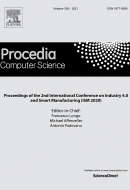
Launched in 2009, Procedia Computer Science is an electronic product focusing entirely on publishing high quality conference proceedings. Procedia Computer Science enables fast dissemination so conference delegates can publish their papers in a dedicated online issue on ScienceDirect, which is then made freely available worldwide. Conference proceedings are accepted for publication in Procedia Computer Science based on quality and are therefore required to meet certain criteria, including quality of the conference, relevance to an international audience and covering highly cited or timely topics. Procedia Computer Science will cover proceedings in all topics of Computer Science with the exception of certain workshops in Theoretical Computer Science, as our Electronic Notes in Theoretical Computer Science https://www.elsevier.com/locate/entcs are the primary outlet for these papers. The journal is indexed in Scopus, the largest abstract and citation database of peer-reviewed literature.
Launched in 2009, Procedia Computer Science is an electronic product focusing entirely on publishing high quality conference proceedings. Procedia Computer Science enables fast dissemination so conference delegates can publish their papers in a dedicated online issue on ScienceDirect, which is then ...
Comparative Study of Ontologies Based ISO 27000 Series Security Standards
Integrating Multiple Geometric Representations within Spatial Data Warehouse Structures for Enhanced Collaborative Decision-Making Processes
Reputation evaluation of georeferenced data for crowd-sensed applications
Towards a Three-Level Framework for IoT Redundancy Control through an Explicit Spatio-Temporal Data Model
Toward Leveraging Smart Logistics Collaboration with a MultiAgent System Based Solution
Real-Time Traffic Data Smoothing from GPS Sparse Measures Using Fuzzy Switching Linear Models
Optimization of Chartered Buses Routes Under Uncertainties Using Probabilistic Vehicle Routing Problem Modeling
Solving energy ordering problem with multiple supply-demand using Bilevel optimization approach